she was wearing a golden fish
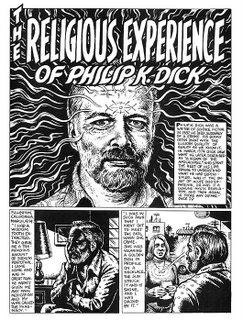
Revel in R. Crumb's portrayal of The Religious Experience of Philip K. Dick.
"There was some kind of time, but it was a different kind of time...A dream time, where the deeds of heroes occur."

Revel in R. Crumb's portrayal of The Religious Experience of Philip K. Dick.
"There was some kind of time, but it was a different kind of time...A dream time, where the deeds of heroes occur."
Posted by
escapegrace
at
8:29 AM
![]()
This collection of remixes from dj BC that mash the Wu-Tang Clan and dixieland classics is brilliant. You can download the entire album or listen to a few mp3s, such as "When the Meth Comes Marching In" (the harmonic pairing of Louis Armstrong and Method Man) or "Dirty Brass" (the Dirty Dozen Brass Band takes on ODB's "Got Your Money").
Posted by
escapegrace
at
8:07 AM
![]()
Egyptian novelist Naguib Mahfouz, the only writer in Arabic to win the Nobel Prize for literature, died on Wednesday in Cairo aged 94, doctors said...
"He came to this world only to write," Egyptian writer Youssef al-Quaid told Egyptian television.
"He was the most famous writer in Egypt ... He had an incredible ability to create and create all his life."
Mahfouz, a prolific writer best known for his Cairo Trilogy, became a literary force when he moved beyond traditional novels to realistic descriptions of Egypt's 20th century experience of colonialism and autocracy.
He was awarded the Nobel Prize in 1988 for works which "formed an Arabian narrative art that applies to all mankind."
Update: The Elegant Variation has a thorough collection of links on the death of Mahfouz.
-
Posted by
escapegrace
at
7:37 AM
![]()
I saw The Illusionist last week, and while it was worth the price of the ticket, I imagine it won't be nearly as good as the latest offering from Christopher Nolan:
-
Posted by
escapegrace
at
7:32 AM
![]()
Match Point: This is the first Woody Allen film I've seen in awhile, and it was entertaining enough, possibly because it didn't feel like a Woody Allen film. (I watched Manhattan for the first time a couple of years ago and did. not. get. it.) The story of social climbing and dangerous infidelity took its time without running overlong, maintained the dramatic tension, and featured pretty, rich people up to no good.
Junebug: This story of the clash between the urban and the rural played out within a single family is an excellent example of how independent films can take more risks and be simply more interesting. I'm sure this film resonated deeply with throngs of city dwellers who have left behind families with whom they no longer have much in common. While all of the acting was solid (I totally missed Will Oldham as an art scout) and I don't want to take anything away from Amy Adams's performance, I'm not quite sure how her role as an chatterbox mother-to-be caught the attention of the academy and led to her Oscar nomination.
Caché: After reading an article in Los Angeles magazine where Steve Erickson called this French exploration of paranoia and isolation "one of last year's best films," my expectations were fairly high. Erickson pointed out that the premise of the film - a couple receives an anonymous video in the mail that contains hours of surveillance footage of their home - was already covered by David Lynch in Lost Highway, to more unsettling effect in my opinion. There is one shocking scene in Caché that is Lynch-worthy, but for the most part, the characters' lack of affect was contagious and left me feeling detached and unmoved.
Transamerica: I don't know why I was reluctant to see this film, afraid perhaps that the focus was too involved with the idea that Felicity Huffman was supposed to be a pre-op transsexual man and not involved enough in themes to which I could relate. Boy, was I wrong. Whereas Caché left me feeling somewhat empty, this film left me so full of emotion, I couldn't tell what I was feeling. All I knew is that I was a richer human being for having seen this film. Felicity Huffman was robbed at the Oscars.
Shopgirl: The script of this film, adapted from a Steve Martin novella, was decent enough, featuring Claire Danes as a lovelorn shopgirl (Mirabelle) seeking her destiny in romance and the glove counter at Saks. Jason Schwartzman (Jeremy) showcased his usual smart & scruffy charm as one love interest while Steve Martin (Ray) played the other older sugar daddy suitor. While I enjoyed the film, what I couldn't quite understand is how Steve Martin played his role. I haven't read the book, so I can't speak to its adaptation, but I could not figure out Mirabelle's attraction to Ray. Either she was more of a golddigger than I gathered or more desperate than I understood, but would it have killed Ray to smile? To say something funny or smart? But who knows? Having never had my student loans paid off by a lover, I may be underestimating the allure.
-
Posted by
escapegrace
at
10:11 AM
0
comments
![]()
 "Pain or damage don't end the world, or despair or f*cking beatings. The world ends when you're dead. Until then, you got more punishment in store. Stand it like a man and give some back." - Al Swearingen, Deadwood
"Pain or damage don't end the world, or despair or f*cking beatings. The world ends when you're dead. Until then, you got more punishment in store. Stand it like a man and give some back." - Al Swearingen, Deadwood
Posted by
escapegrace
at
9:50 AM
0
comments
![]()
Michelle Huneven interviews Claire Messud in the LA Weekly, upon the release of Messud's new novel The Emperor's Children:
So you didn't exactly set out to write a 9/11 novel.
I was confronted with this problem. In 2001, I was writing this novel set in New York in 2001. Even though I had to start it again, it was already so present in my mind, it wasn'’t a novel set in 1999, it was set in 2001. People have said, Oh, you'’ve written a 9/11 novel, but I was trying to write an August 1914 novel. In August 1914, everybody was punting up and down the Thames River and eating strawberries and having picnics, and then, a few months later, they were in uniform and being sent out to the front - — an absolute disjunction.
On the same topic, NPR asks "Can Fiction Help Make Sense of Sept. 11?" Of the texts I've read that have approached the subject, including Extremely Loud and Incredibly Close and Twilight of the Superheroes, I felt Benjamin Kunkel's Indecision captured the complete sense of unreality that followed the crash of the first plane. Kunkel's characters might have seemed callous as they speculated on what was happening, but I remember the same lack of recognition as to how irrevocably our world had just changed.
Update: George Saunders's "The Cats of 9/11" appeared the day of this post.
-
Posted by
escapegrace
at
8:11 AM
![]()
In honor of Dorothy Parker's birthday this week, a link to a recent Bookforum article about Parker's bequest to the NAACP and Lillian Hellman's distress in her role as executor.
On the face of it, Hellman seemed pleased about King, publicly applauding Parker's "strong feelings about civil liberty and Negro rights" and saying she was "very impressed" by such a noble bequest. But in private she was fuming. King irritated her—apparently he reminded her of southern preachers from her childhood—but what upset her most was her friend's betrayal. Having managed to acquire control of Hammett's literary estate, Hellman had also expected to inherit Parker's; indeed, she believed she was entitled to it. As literary executor, she would be expected to make all decisions but would not benefit financially; proceeds from sales of the work would go to King, the new owner of the copyrights. Within a year of Parker's death, the civil-rights leader was assassinated and the estate became property of the NAACP, an organization for which Hellman had no respect whatsoever because she considered it timid and ineffectual. Ignoring the fact that King had been a vigorous thirty-six at the time of Parker's demise, Hellman continued to berate her friend and hold her personally responsible for the fate of the coveted copyrights. In a gloves-off mood, she didn't mince words with playwright Howard Teichmann: "That goddamn bitch Dorothy Parker. . . . You won't believe what she's done. I paid her hotel bill at the Volney for years, kept her in booze, paid for her suicide attempts—all on the promise that when she died, she would leave me the rights to her writing. . .But what did she do? She left them directly to the NAACP. Damn her!"
-
Posted by
escapegrace
at
8:56 AM
![]()
Boing Boing points to Signs of Witness, "the interactive site that tracks putative signs of the supposed apocalypse end times." Some of the posts cover reports of the Virgin Mary appearing in chocolate and statues of Hindu gods drinking milk, but today's post is probably the most convincing:
So the other day I got up and saw an article about how global warming was melting the ice caps, increasing the likelihood of hurricanes, making diseases like the Black Plague primed for a comeback, pushing tropical diseases north, helping to cause oceanic dead zones and likely to increase heat related deaths severely as time goes on…The SAME DAY I saw an article about how pesticides are found in almost all water systems now, and ANOTHER ONE with a study showing how babies are harmed by exposure to small amounts of pesticides and herbicides. Then later that day I read that there are a variety of toxins now found in cow’s milk, across the west, due to a massive leak into the water of a rocket fuel byproduct. Then I read that the US Government is starting new experiments–and breaking a treaty to do it–with biowarfare agents. Then I read that Russian nuclear weapons that went missing…are still missing. Then I read that a global mutant-flu pandemic is still expected…Then I read that the govt has failed to find a place to bury the nuclear waste we’ve been building up…and it’s starting to leak. And that night I heard that the Iranians are definitely building nuclear weapons and the USA is pushing toward attacking them.
And all this was in one day. So who needs magical manifestations of the end times. This is all about…what WE do.
-
Posted by
escapegrace
at
8:22 AM
![]()
I'm very excited about this forthcoming Brian De Palma adaptation of James Ellroy's The Black Dahlia:
You can read more about The Black Dahlia mystery here and here. I had no idea Woody Guthrie was once considered a suspect.
-
Posted by
escapegrace
at
8:25 AM
![]()
The internets are abuzz about David Foster Wallace's appearance in the New York Times this weekend, writing about tennis star Roger Federer as religious experience.
Of course, in men’s sports no one ever talks about beauty or grace or the body. Men may profess their “love” of sports, but that love must always be cast and enacted in the symbology of war: elimination vs. advance, hierarchy of rank and standing, obsessive statistics, technical analysis, tribal and/or nationalist fervor, uniforms, mass noise, banners, chest-thumping, face-painting, etc. For reasons that are not well understood, war’s codes are safer for most of us than love’s. You too may find them so, in which case Spain’s mesomorphic and totally martial Rafael Nadal is the man’s man for you — he of the unsleeved biceps and Kabuki self-exhortations. Plus Nadal is also Federer’s nemesis and the big surprise of this year’s Wimbledon, since he’s a clay-court specialist and no one expected him to make it past the first few rounds here. Whereas Federer, through the semifinals, has provided no surprise or competitive drama at all. He’s outplayed each opponent so completely that the TV and print press are worried his matches are dull and can’t compete effectively with the nationalist fervor of the World Cup.
-
Posted by
escapegrace
at
8:13 AM
![]()
 After helping my cousin build a truckload of IKEA furniture, I was wildly amused by this comic from Toothpaste for Dinner. If you haven't discovered the fruits of Drew's imagination, you're in for a treat.
After helping my cousin build a truckload of IKEA furniture, I was wildly amused by this comic from Toothpaste for Dinner. If you haven't discovered the fruits of Drew's imagination, you're in for a treat.
-
Posted by
escapegrace
at
8:04 AM
![]()
The latest from the hilarious mind of Aziz Ansari (and my triumphant first attempt at embedding You Tube, marred only by my embarrassment that it was so easy and took me so long):
-
Posted by
escapegrace
at
7:32 PM
![]()
 "Never before had I believed or suspected that I had a soul but just then I knew I had. I knew also that my soul was friendly, was my senior in years and was solely concerned for my own welfare. For convenience I called him Joe." - Flann O'Brien, The Third Policeman
"Never before had I believed or suspected that I had a soul but just then I knew I had. I knew also that my soul was friendly, was my senior in years and was solely concerned for my own welfare. For convenience I called him Joe." - Flann O'Brien, The Third Policeman
Posted by
escapegrace
at
10:25 AM
0
comments
![]()
There was much ado this week in response to Nobel Prize winner Gunter Grass's admission that he served in the SS as a teenager. The general consensus seems to be that the problem is not his association with the Nazis, but his smug hypocrisy for the rest of his life. Meanwhile, the family of Wizard of Oz creator L. Frank Baum has apologized this week for racist op-eds he wrote in South Dakota that may have catalyzed the Wounded Knee massacre (via bookslut). Finally, there has been much commentary on Bush's choice of vacation reading: Albert Camus's The Stranger. (Cue The Cure.) Slate tries to get to the bottom of Bush's selection...
Whatever the reasons, Camus' story line is ripe for geopolitical literary misinterpretation. The main character, Meursault, spends much of his life as the young George Bush did, engaging in escapades that demonstrate little drive or motivation. On a visit to the beach with friends, he gets into a fight with some Arabs. Later, he finds one of the Arabs and without much further provocation shoots him repeatedly. During the circus-trial that follows, and the long hours Meursault spends in jail, he is remorseless and unable to engage in contemplation. On the day of his execution, he has a flickering thought that he might have lived another life. But mostly he's excited about the day and hopes that everyone will cheer for his death.
...and Salon publishes Bush's book report. As usual, however, Jon Stewart cuts to the heart of the matter.
-
Posted by
escapegrace
at
10:15 AM
![]()
After about a year of never being able to get the song "Such a Lovely Thing" out of my head, I finally got to see it performed live at the Devotchka show last night at the Troubadour. What I thought would be the highlight was just one of many as these Denver musicians rocked the house. (I've decided my habitually poor concert photos are a result of my reluctance to squeeze through the crowd and get closer to the stage. Oh well.) Singer Nick Urata had a guitar playing/dancing move that was damn near irresistible to this audience member, but the other musicians were equally impressive, especially Jeanie Schroder who alternated between the upright bass and a Christmas-light festooned tuba, as seen in this photo from the band's website.
Singer Nick Urata had a guitar playing/dancing move that was damn near irresistible to this audience member, but the other musicians were equally impressive, especially Jeanie Schroder who alternated between the upright bass and a Christmas-light festooned tuba, as seen in this photo from the band's website.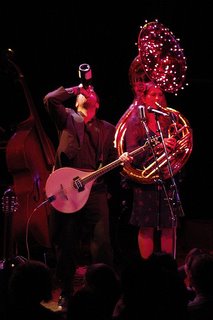 If you're in the Southwest or New York, you're in luck. Their tour continues through September.
If you're in the Southwest or New York, you're in luck. Their tour continues through September. -
-
Posted by
escapegrace
at
1:03 PM
![]()
My...um...fondness for David Mitchell is well-documented, and his inclusion in the Booker longlist is a perfect opportunity to link to some of his recent activities. You can listen to audio interviews here and in two parts at the Bat Segundo Show here.
Part I:
Subjects Discussed: The similarities between Jason Taylor and David Mitchell, idiosynchratic vernacular, first-person vs. third-person voice, index cards, how Granta unexpectedly kicked off Black Swan Green, the correct pronounciation of Nabokov, the difference between sandwiches in the US and the UK, the use of 1980s technology in writing, the Falkland Islands, on selecting cultural references from 1982, Friendster, the regulation of UK schools over the past thirty years, the use of visual elements in BSG, authenticity, money and Thatcher’s England, MacGuffins in novels and life, being nice to horrid people, the Julia principle, the politics of language, hip-hop culture, the threat of conformity vs. Jason Taylor’s resilience, shaking off the Murakami yoke, the Ed Park review, on using characters from other books, and naming the headmaster Nixon, and character names that “stick on the eyeball.”
Part II:
Subjects Discussed: The Simpsons, the ambiguity of Norman Bates, transcontinental reception, the unexpected reception of Black Swan Green, the Stranger review, Haruki Murakami, finding auctorial voice, the “fourth book” breakthrough, avoiding the pitfalls of commercial writing, laziness, stylistic restraints and imagination, politicians, flexible opinions, compartmentalizing narrative components, conclusions of novels, the perfect songs, the Beatles, information on the fifth novel and the kind of book Mitchell is shooting for.
Mitchell also appeared on KRCW's Bookworm last month. Counterbalance provides extensive four-part coverage of the reading I attended in April. The Telegraph and The New Republic have reviews, the latter of which also covers the challenge of reviewing a book you like:
Bad reviews are motivated by anger, but good reviews are motivated by love; and it is easier to become angry than to fall in love. Every reader had a first love, most likely in childhood: a book that we could not get enough of, and guarded selfishly for fear that someone else might come to think of it as their own; a book with which we identified completely; a book to which we probably would not want to return as adults for fear that it might not live up to our memories. Perhaps we were serial monogamists, who exhausted the entire work of one author only to move on to another the next month or year. Perhaps we were polygamists, who could not be satisfied by one book at a time, but had to have many all at once, from different genres and different time periods. But whatever our inclinations, over the years our capacity to love books becomes dulled by repeated frustration. Every time we pick up a book, we expect to fall in love; but after a certain number of disappointments, our expectation turns to mere hope; and eventually we give up even that.
But no true reader ever gives up entirely. We still want to be moved deeply; we are still looking for books that, as Orwell put it, will burst the thermometer. But for the critic, finding such a book brings its own set of problems. Falling in love, even with a book, makes you vulnerable, and most of us are not inclined to parade our vulnerabilities in public. Even worse, falling in love makes you blind to faults; and so you find yourself overcompensating, looking for flaws where none exist. Also, as a reader it is wonderful to be alone with your love, but the reviewer has a professional obligation to sing a good book's praises from the mountaintops. But how do you convince anyone that you have found "a novel of real merit" when the simplest phrases ("I liked it") are boring and the elaborate ones ("superbly matchless") have lost their meaning?
-
Posted by
escapegrace
at
1:00 PM
![]()
Jessica Clark looks at Comedy Central's role in contemporary politics:
This evolution of political comedy has everything to do with the collapse of public trust in our truth-telling institutions, hastened by the right’s sustained attack on what one GOP insider dismissed as the “reality-based community.” (“Reality,” quips Colbert in full conservative drag, “has a well-known liberal bias.”)
We now routinely watch the mainstream media with the expectation that we’re being spun, but when did we start watching comedy for the real deal?
Posted by
escapegrace
at
9:07 AM
![]()
Ed Champion has posted the Literary Hipster's Handbook - 2006 Q3 Edition:
“Booker nod”: A literary event with tiresome results, often producing soporific qualities in the participant. Named after the predictable nature of the 2006 Booker Award longlist, but recently expanded to include bookstore events, boardroom meetings, and drab cocktail parties. A legitimate Booker nod must involve someone falling asleep, thus signaling to other hipsters that the event should be avoided at all costs.
Note: The Booker longlist was announced on Monday.
-
Posted by
escapegrace
at
8:40 AM
![]()
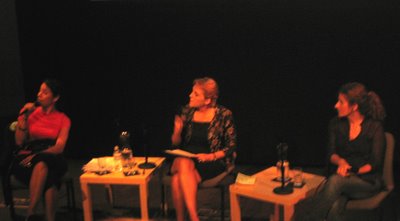 L to R: Sandra Tsing Loh, Meghan Daum, Nicole Holofcener
L to R: Sandra Tsing Loh, Meghan Daum, Nicole Holofcener
Posted by
escapegrace
at
8:07 AM
1 comments
![]()
 Last summer, I couldn't get enough of OK GO's video for "A Million Ways" and their synchronized silliness. Now the boys return to my heart with more funky footwork in a new video for "Here It Goes Again" - this time on treadmills!
Last summer, I couldn't get enough of OK GO's video for "A Million Ways" and their synchronized silliness. Now the boys return to my heart with more funky footwork in a new video for "Here It Goes Again" - this time on treadmills!
-
Posted by
escapegrace
at
7:58 AM
![]()
 This photo most accurately captures the absurdity of Boy George's community service today in New York.
This photo most accurately captures the absurdity of Boy George's community service today in New York.
Posted by
escapegrace
at
8:38 AM
![]()
At Slate, Marisa Meltzer bids farewell to Sleater-Kinney.
One day, driving in a friend's car, I heard 2002's One Beat and I realized that Sleater-Kinney had grown up and moved on as much as I had. The album sounded like it was made by thirtysomething women who were still frustrated by the status quo—and played louder than ever to prove it—but you could hear that they were living with children and mortgages and standing weekly therapy appointments. Their last and arguably best record, The Woods, came out last year and has a certain finality to it, packed with songs about the complications of success and long-term relationships, ending with the warped lullaby "Night Light," as if they knew all along it would be their last one.
-
Posted by
escapegrace
at
8:18 AM
![]()

It was so nice to weed my bookmarks last Sunday that I'm going to make it a weekly tradition.
Posted by
escapegrace
at
6:47 PM
![]()
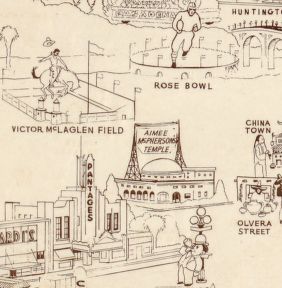 A current exhibition from the Library of Congress presents historical maps of Los Angeles - both at the Disney Concert Hall (the only LOC exhibition venue located outside of DC) and here at Los Angeles Mapped. Above is a detail from a 1937 "official moviegraph of the land of stars, where they live, where they work, and where they play" (copyrighted by Don Boggs). As you can see, the map also includes "where they worship" in the form of "Aimee McPherson's Temple" a.k.a. the Angelus Temple. (See the full map here.)
A current exhibition from the Library of Congress presents historical maps of Los Angeles - both at the Disney Concert Hall (the only LOC exhibition venue located outside of DC) and here at Los Angeles Mapped. Above is a detail from a 1937 "official moviegraph of the land of stars, where they live, where they work, and where they play" (copyrighted by Don Boggs). As you can see, the map also includes "where they worship" in the form of "Aimee McPherson's Temple" a.k.a. the Angelus Temple. (See the full map here.)
Aimee Semple McPherson is credited with an impressive number of firsts. She is thought to be the first woman to cross America in an automobile without a man’s help. She was the first woman to lead a religious service in London’s Royal Albert Hall, the first woman to preach a sermon over the “wireless telephone,” and the first woman to receive a commercial license from the FCC. She founded the first religious broadcasting station, KFSG (Kall Foursquare Gospel), preaching to hundreds of thousands of people daily. McPherson was the first evangelist to bring revivalism into large-scale commercial stadiums. She preached in more than 100 cities and towns from 1917 to 1923 and later alleged that she gave more sermons than any preacher who ever lived. The evangelist was even made an honorary colonel by the U.S. Army.
Posted by
escapegrace
at
7:56 AM
![]()
 16. The Accidental by Ali Smith
16. The Accidental by Ali Smith
If William Faulkner and Ian McEwan birthed a daughter who wrote a novel, it would be The Accidental. This is the first book in a long time that I felt I should read a second time. 17. The Brooklyn Follies by Paul Auster
17. The Brooklyn Follies by Paul Auster
Aside from some exposition on American literature, this novel is barely recognizable as an Auster offering. It is, however, very charming and humane, with characters that you miss when they're gone. 18. Arthur & George by Julian Barnes
18. Arthur & George by Julian Barnes
This book took forever to read. In the end, I'd have to say it's much too dry, even if (because?) the story told does outline an important reform in British legal history largely inspired by the efforts of Arthur Conan Doyle. 19. The Consolations of Philosophy by Alain de Botton
19. The Consolations of Philosophy by Alain de Botton
I want to marry Alain de Botton. His brand of philosophy-lite is just what the doctor ordered and it works magic.
Mere hours after beginning the book and realizing I wanted to spend more time with philosophy, I was offered an Intro to Philosophy class to teach. See? Magic.
19 down, 33 to go.
-
Posted by
escapegrace
at
7:57 AM
0
comments
![]()
This innocent gallon of milk on sale at Amazon's new grocery section has been mobbed by literary prankster/reviewers.
A deadly strain of weapons-grade HRV-A was released in my office building. The place was immediately quarantined and we were all told that we had 3 hours to live. Fortunately, someone left a gallon of Tuscan Whole Milk in the cafeteria refrigerator. A few of my coworkers and I decided to sit down and enjoy our last moments drinking this delicious white colloid. And then a miraculous thing happened. I felt that I had enough strength to crawl over to this computer and waste my last minutes typing a revief;ldk
Posted by
escapegrace
at
8:34 AM
![]()

For brunch, some old links that have been lying around...
Posted by
escapegrace
at
10:18 AM
0
comments
![]()
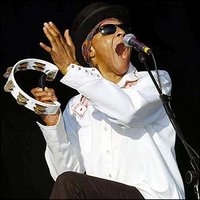 Arthur Lee has died after a battle with leukemia.
Arthur Lee has died after a battle with leukemia.
Lee, a Memphis native who referred to himself as "the first so-called black hippie," formed Love in Los Angeles in 1965, emerging from the same scene as groups like the Byrds, Buffalo Springfield, the Doors and the Mamas and Papas.
The first multiracial rock band of the psychedelic era, Love recorded three groundbreaking albums fusing traditional folk rock and blues with symphonic suites and early punk.
Bands as diverse as Led Zeppelin, Echo and the Bunnymen, and Siouxsie and the Banshees cited Love as an influence.
Showing up at work one night at a club on Sunset and seeing Arthur Lee for the first time is a highlight of my time in Los Angeles.
---
Posted by
escapegrace
at
8:34 AM
![]()
This is the actual headline:
Posted by
escapegrace
at
7:43 AM
1 comments
![]()
Once upon a time, this guy read this article and now the girls of Central Park are fending off lines like "Hey baby, I find my happiness in hardness against myself and others. Wanna get a cup of coffee?"
-
Posted by
escapegrace
at
8:24 AM
![]()
Watch Hollywood's babies morph into creepy adults - right before your very eyes!
Posted by
escapegrace
at
8:28 AM
![]()